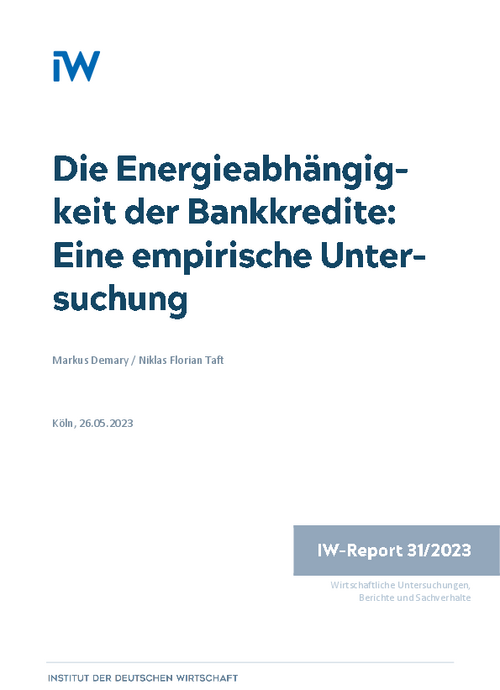Russia's war against Ukraine has highlighted the vulnerability of the Federal Republic of Germany to Russian energy imports, especially natural gas.

The Energy Dependence of Bank Loans

Russia's war against Ukraine has highlighted the vulnerability of the Federal Republic of Germany to Russian energy imports, especially natural gas.
The threat of a gas shortage has led to a massive increase in the price of gas, which has posed major challenges, especially for energy-intensive companies that use natural gas to generate electricity, but also to generate process heat. If borrowers are affected by sharply rising energy costs, the question is to what extent risks for banks arise from the energy crisis.
For this analysis, we define the measure of energy credit burden. This describes the ratio of the energy intensity of an industry to the volume of loans granted by a bank or banking group to precisely these industries. It is then possible to sum up the energy credit burden across the various industries. In this way, we obtain a ratio that describes how much energy is behind the total volume of loans financed by the bank or banking group. Banks or banking groups with a higher energy credit burden thus carry a higher credit default risk in their portfolios in the event of an energy crisis compared to a bank or banking group with a low energy credit burden.
The analysis of the energy loan burden has shown that banks' loan portfolios are indeed vulnerable to the energy price shock due to their energy dependence. However, this does not necessarily result in a warning. The following analysis results suggest that the energy crisis is not a banking crisis:
- The large banks, which are characterized by a low return on equity and low equity ratios, have quite moderate values for energy credit burdens.
- The gas loan burden is mainly focused on the regional banks, the state banks and the development banks. Although the regional banks are larger than the savings banks and credit cooperatives, they are still small compared with the state banks and the development banks. However, the equity ratios of the state banks and development banks are quite high, so that they are quite capable of absorbing unexpected losses.
- The petroleum loan burden focuses primarily on the branches of foreign banks. Here, too, the equity ratios are sufficiently high.
- The coal loan burden is quite moderate for all bank groups.
- The industries with a high energy intensity, and especially a high dependence on gas and oil, have significantly higher equity ratios compared with the less energy-intensive industries. What can be expected here, in contrast to a skewing, is that these companies will relocate due to high energy costs.
Overall, therefore, it cannot be concluded that the current energy crisis will result in a banking crisis. This also includes the fact that the banking system has become much more robust as a result of the adjustment of financial market regulation following the global financial market crisis of 2008 and 2009 and is better able to shoulder negative effects. This was already evident in the Covid 19 crisis, when banks were able to provide the economy with loans in a fairly stable manner despite the recession and the threat of corporate insolvencies.

The Energy Dependence of Bank Loans

More on the topic

This time is different but still risky: Banking crisis instead of financial crisis
The current crisis of some American and European banks inevitably triggers fears that an international banking crisis could lead to a new financial crisis. But things in 2023 are very different from those in 2007.
IW
Financing Gaps of Companies during the Covid-19 Pandemic
For firms’ business and investment decisions their access to finance is a critical determinant. In times when access to finance becomes tight, corporations face either higher capital costs or they have to postpone their investment decisions when credit lines ...
IW